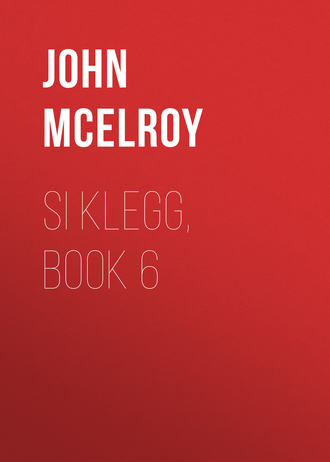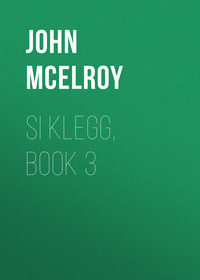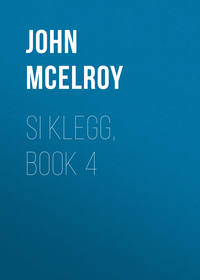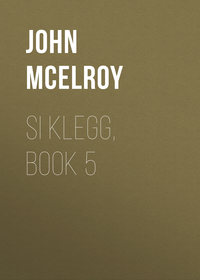 полная версия
полная версияSi Klegg, Book 6
There was a strangeness about everything that they could not comprehend.
It was their regiment—the 200th Ind.; it was made up of the same companies, with the great majority of the men the same, but it was very far from being the 200th Ind. which crossed the Ohio River in September, 1862.
Marvelous changes had been wrought by 18 months' tuition in the iron school of war, in the 10 separate herds of undisciplined farmer boys which originally constituted the regiment. Yellow, downy beards appeared on faces which had been of boyish smoothness when the river was crossed, but this was only one of the minor changes. There was an alertness, a sureness, a self-confidence shining from eyes which was even more marked. Every one carried himself as if he knew precisely what he was there for, and intended doing it. There was enough merriment around camp, but it was very different from the noisy rollicking of the earlier days. The men who had something to do were doing it with systematic earnestness; the men who had nothing to do were getting as much solid comfort and fun as the situation afforded. The frothy element among officers and men had been rigorously weeded out or repressed. All that remained were soldiers in the truest sense of the word. The change had been very great even since the regiment had lined up for the fearful ordeal of Chickamauga.
"Did you ever see a gang o' half-baked kids get to be men as quick as these boys?" Si asked Shorty. "Think o' the awkward squads that used to be continually fallin' over their own feet, and stabbing theirselves with their own bayonets."
"Seems so," answered Shorty, "but I don't know that they've growed any faster'n we have. Walt Slusser, who's bin Orderly at Headquarters, says that he heard Capt. McGillicuddy tell Col. McBiddle that he'd never seen men come out as me and you had, and he thought we'd make very effective noncommish."
"Probably we've all growed," Si assented thoughtfully. "Just think o' McBiddle as Lieutenant-Colonel, in place o' old Billings. Remember the first time we saw McBiddle to know him? That time he was Sergeant o' the Guard before Perryville, and was so gentle and soft-spoken that lots o' the boys fooled themselves with the idee that he lacked sand. Same fellers thought that old bellerin' bull Billings was a great fightin' man. What chumps we all wuz that we stood Billings a week."
"Wonder if I'm ever goin' to have a chanst for a little private sociable with Billings? Just as I think I'm goin' to have it, something interferes. That feller's bin so long ripe for a lickin' that I'm afraid he'll be completely spiled before my chanst comes."
"But I can't git over missin' so many familiar voices in command, and hearin' others in their places," said Si. "That battalion drill they wuz havin' as we come in didn't sound like our rijimint at all. I could always tell which was our rijimint drillin' half a mile away by the sound of the voices. What a ringin' voice Capt. Scudder had. It beat the bugle. You could hear him sing out, 'Co. C, on right, into line! Forward, guide right—March!' farther'n you could the bugle. The last time I heard him wuz as we wuz' going up Snodgrass Hill. A rebel bullet went through his head just as he said, 'March!' Now, Lieut. Scripps is in command o' Co. C, and he's got a penny-whistle voice that I can't git used to."
"Lieut. Scripps's a mighty good man. He'll take Co. C as far as Capt. Scudder would."
"I know that Scripps's all right. No discount on him. But it don't seem natural, that's all. Every one o' the companies except ours has a new man in command, and in ours Capt. McGillicuddy's voice has got a different ring to it than before Chickamaugy."
"Practicin' to command the battalion," suggested Shorty. "You know he'll be Major if McBiddle's made a full Kurnel."
"That reminds me," said Shorty, "that our squad o' recruits'll probably fill up the rijimint so's to give McBiddle his eagle. They'll be 'round presently to divide up the squad and assign 'em to companies. As all the companies is about equally strong, they'll divide 'em equally—that'll make six and one-half boys to each company. Capt. McGillicuddy bein' the senior Captain, is to have first choice. We want to pick out the best six and one-half for our company and put 'em in one squad at the right or left, and give the Captain the wink to choose 'em."
"If we do it's got to be done mighty slick," said Si. "They're all mighty good boys, and spunky. They'll all want to go with us, and if they find out we've made any choice they'll never forgive us. I'd a'most as soon have one six boys as another, yit if I had to pick out six I believe I'd take Harry Joslyn, Gid Mackall, Alf Russell, Monty Scruggs, Jim Humphreys and Sandy Baker."
"And Pete Skidmore," added Shorty. "We've got to take special care o' that little rat. Besides, I want to. Somehow I've took quite a fancy to the brat."
"Yes, we must take little Pete," assented Si. "The proportion's six and one-half to a company. He 'll pass for the half man. But it won't do to let him know it. He thinks he's as big as any man in the rijimint. But how're we goin' to fix it not to let the other boys know that we've picked 'em out?"
"I'll tell you what we'll do," said Shorty, the man of many wiles. "When the boys are drawed up in line and Capt. McGillicuddy goes down it to pick 'em out, you stand at attention, two paces in front, facin' 'em and lookin' as severe and impartial as a judge on the bench. I'll stand behind you with my leg against your'n, this way, and apparently fixing my gun-lock. When Cap comes in front o' one that we want, yo give me a little hunch with your leg, and I'll make the lock click."
"Splendid idee," said Si. "I'll go and post the Cap while you git the boys into line."
When Shorty returned to the squad he found them in feverish excitement about the distribution to the different companies. As he and Si had apprehended, all were exceedingly anxious to go with them into Co. Q, which Si and Shorty had unwittingly impressed upon them was the crack company of the regiment, and contained the very cream of the men. To be assigned to any other company seemed to them, if not an actual misfortune, a lack of good luck.
"Nonsense," Shorty replied to their eager entreaties; "all the companies in the 200th Injianny is good, prime, first-class—better'n the companies in ary other rijimint. You're playin' in great luck to git into any one o' 'em, I tell you. You might've got into one o' 'em rijimints that're back there at Nashville guardin' fortifications, or one o' 'em that lost their colors at Chickamaugy. I'd ruther be the tail end o' the 200th Injianny, than the Drum Major o' any other."
"That's all right," they shouted. "We're glad we're in the 200th Injianny, but we want to be in Co. Q."
"Well, you can't all be in Co. Q. Only six and one-half of you. The rest's got to go to other companies."
"Say, Corpril," spoke up Harry Joslyn, "you'll see that I git in, won't you? You know I shot that rebel at the burnt bridge."
"And didn't I shoot one, too?" put in Gid Mackall. "Just as much as you did. They want tall men in the company, don't they, Corpril? Not little runts."
"And didn't I watch the crossing down there at the burnt bridge?" pleaded Jim Humphreys.
"And git scared to death by a nigger huntin' coons," laughed the others.
"Who kept the rebel from gittin' back to the train and settin' it on fire, but me and Sandy Baker?" piped up little Pete Skidmore. "Who got lost, and nearly killed by a locomotive. Don't that count for nothin'?"
"Boys," said Shorty, leaning on his musket, and speaking with the utmost gravity, "this's a great military dooty and must be performed without fear, favor nor affection. I'd like to have you all in Co. Q, but this's a thing 'bout which I hain't got no say. There's a great many things in the army 'bout which a Corpril hain't as much inflooence as he orter have, as you'll find out later on. Here comes the Captain o' Co. Q, who, because o' his rank, has the first pick o' the recruits. He's never seen you before, and don't know one o' you from Adam's off-ox. He has his own ideas as to who he wants in the company, and what he says goes. It may be that the color o' your hair'll decide him, mebbe the look in your eyes, mebbe the shape o' your noses. 'Tention! Right dress! Front! Saloot!"
Capt. McGillicuddy came down at the head of the company officers of the regiment, and took a comprehensive survey of the squad.
"Fine-looking lot of youngsters," he remarked. "They'll make good soldiers."
"Every one o' them true-blue, all wool and a yard wide. Captain," said Si.
"You'll play fair, now, Captain, won't you, and choose for yourself?" said Capt. Scripps. "I've no doubt they're all good boys, but there's a choice in good boys, and that Sergeant of yours has learned where the choice is. You let him stay back, while you go down the line yourself."
"Certainly," replied Capt. McGillicuddy. "Serg't Klegg, stay where you are."
Si saluted and took his position, facing the line, with a look of calm impartiality upon his face. Shorty turned around and backed up to him so that the calves of their legs touched, and began intently studying his gunlock.
Capt. McGillicuddy stepped over to the right of the line stopped in front of Harry Joslyn and Gid Mackall. Shorty full-cocked his gun with two sharp clicks.
"You two step forward one pace," said Capt. McGillicuddy to the two radiant boys, who obeyed with a jump. The Captain walked on down the line, carefully scrutinizing each one, but did not stop until Shorty's gun clicked twice, when he was in front of Alf Russell and Monty Scruggs.
"Step forward one pace," he commanded.
He proceeded on down the line until he came in front of Jim Humphreys and Sandy Baker, when Shorty's gun clicked again.
"You two step forward one pace," he commanded. "Gentleman, I've got my six. The rest are yours."
"But you hain't got me. You've lost me," screamed Pete Skidmore, dismayed at being separated from Sandy Baker. Shorty's gun clicked again.
"I believe that there is a fraction of a half a man to be distributed around," the Captain said, turning to the other officers. "We agreed to draw cuts for that choice. But as that's the smallest boy in the lot I'll take him for my fraction. I think that's fair. Step forward, there, you boy on the left."
"All right Captain," laughed Capt. Scripps. "You've got the pick of the men, and I'm glad of it.
"I know you have, for I've been watching that Corporal of yours. I know him of old. I've played cards too often with Shorty not to keep my eye on him whenever he is around. I saw through that gun-lock trick."
"The trouble with you fellows," responded Capt. McGillicuddy, "is that you are constantly hunting around for some reason rather than the real one for Co. Q being always ahead of you. It isn't my fault that Co. Q is the best company in the regiment. It simply comes natural to the men that make up the company. You gentlemen divide up the rest among you, and then come down to the sutler's and we'll talk the matter over. Serg't Klegg, take these men down to the company and have the Orderly provide for them."
"Hello, awful glad to see you back—and you, too, Shorty," said the busy Orderly-Sergeant, speaking in his usual short, snappy sentences, without using any more words than absolutely necessary. "We need you. Short of non-commish. Two Sergeants off on detached duty and two Corporals in hospital. Being worked for all we're worth. Both of you look fine. Had a nice, long rest. In great shape for work. Pitch in, now, and help me. First, let's get the names of these kids on the roll. Humphreys—we've got two other Humphreys, so you'll answer to Humphreys, 3d.
"But I don't want to be with the Humphreys, sir," broke in Jim. "Me and Monty Scruggs—"
"Hold your tongue," said the Orderly sharply. "Don't interrupt me. If you speak when you're spoken to you'll do all the talking expected of you.
"Joslyn, you're after Jones, 3d. M—M—Mackall, you come after Lawrence."
"But you've put me after Joslyn," protested Gid. "He's never ahead of me."
"Shut up," answered the Orderly. "I do the talking for this company. Russell, Scruggs, Skidmore; there, I've got 'em all down. Si, go down toward Co. A and find Bill Stiles and walk him up to the guard-tent and leave him there to cool off. He's got his hide full of coffin varnish somewhere, and of course wants to settle an old score with that Co. A man, who'll likely knock his head off if he catches him. Shorty, go back there to the cook tent and shake up those cooks. Give it to them, for they're getting lazier every day. I want supper ready as soon's we come off dress parade. Here, you boys, trot along after me to the Quartermaster's tent, and draw your blankets, tents, haversacks and canteens. Shorty, as soon's you're through with the cooks, go to the left of the company and start to fixing up a place for these boys' tents. Si, get back as soon's you can, for I want you to take the squad down after rations. Then you'll have to relieve Jake Warder as Sergeant of the Guard, for Jake's hardly able to be around."
The Orderly strode off toward the Quartermaster's tent at such a pace that it gave the boys all they could do to keep up with him. Arriving there he called out sharply to the Quartermaster-Sergeant:
"Wes, give me seven blankets."
That official responded by tossing the required number, one after another, counting them as he did so. As the Orderly caught them he tossed them to the boys, calling their names. Gid Mackall happened to be looking at a battery of artillery when his name was called, and received the blanket on the back of his neck, knocking him over.
"'Tend to your business, there; don't be gawking around," said the Orderly sternly. "Now, Wes, seven halves of pup-tents."
These were tossed and counted the same way. Then followed canteens, haversacks and tin plates and cups.
"Now, boys, there's your kits. Give you your guns tomorrow. Hurry back to the company street and set up those tents on railroad time, for it's going to rain. Jump, now."
When they reached Shorty he hustled them around to pitch their tents, but he was not fast enough to please the Orderly, who presently appeared, with the remark:
"Cesar's ghost. Shorty, how slow you are. Are you going to be all night getting up two or three tents? Get a move on you, now, for there's a rain coming up, and besides I want you for something else as soon's you're through with this?"
"Who is that man, Corpril?" asked Monty Scruggs, as the Orderly left.
"That's the Orderly-Sergeant of Co. Q."
"Orderly-Sergeant?" repeated Monty dubiously. "Who's he? I've heard of Captains, Majors, Colonels and Generals, but never of Orderly-Sergeants, and yit he seems to be bigger'n all of 'em. He has more to say, and does more orderin' around than all of 'em put together. He even orders you and Sarjint Klegg. Is he the biggest man in the army?"
"Well, SO far's you're concerned and to all general purposes he is. You needn't pay no partickler attention as a rule to nobody else, but when the Orderly speaks, you jump, and the quicker you jump the better it'll be for you. He don't draw as much salary, nor put on as many frills as the bigger fellers, but you hain't nothin' to do with that. You kin find fault with the Captain, criticize the Kurnel, and lampoon the General, but you don't want to give the Orderly no slack. He's not to be fooled with. Russell, run up there and snatch that spade to dig ditches around these tents."
"When I enlisted," Monty confided to Alf Russell, "I thought I'd do my best to become a Captain or a General. Now, I'm dead anxious to be an Orderly-Sarjint."
CHAPTER V. THE YOUNG RECRUITS
ARE GIVEN AN INITIATION INTO ARMY LIFEBY the time Shorty had gotten the boys fairly tented, he was ordered to take a squad and guard some stores at the Division Quartermaster's. Si, instead of going on camp-guard, had to go out to the grand guard. When he came back the next morning the Orderly-Sergeant said to him:
"See here, Si, you've got to take that squad of kids you brung into your particular charge, and lick 'em into shape. They need an awful sight of it, and I hain't got any time to give 'em. I've something else to do besides teaching an infant class. I never was good at bringing children up by hand, anyway. I ain't built that way. I want you to go for them young roosters at once, and get 'em into shape in short meter. Marching orders may come any day, and then we want everybody up and dressed. There'll be no time for foolishness. Those dratted little rats were all over camp last night, and into more kinds of devilment than so many pet crows. I've been hearing about nothing else this morning."
"Why," said Si, "I supposed that they was too tired to do anything but lay down and go to sleep. What'd they do?"
"Better ask what they didn't do," replied the Orderly. "They done everything that a passel o' impish school boys could think of, and what they couldn't think of them smart Alecks down in the company put 'em up to. I'm going to put some o' them smarties through a course o' sprouts. I like to see boys in good spirits, and I can enjoy a joke with the next man, but there's such a thing as being too funny. I think a few hours o' extry fatigue duty will reduce their fever for fun."
"Why, what'd they do?" repeated Si.
"Well, in the first place, they got that Joslyn and Mackall to mark a big number 79 on their tents, and then put the same, with their names, on a sheet of paper, and take it up to the Captain's tent.
"The Captain was having a life-and-death rassle with Cap Summerville over their eternal chess, when he's crosser'n two sticks, and liable to snap your head off if you interrupt him. 'Hello, what do you want? What's this?' says he, taking the paper."
"'Them's our names and addresses,' says the brats, cool as cucumbers. Thought we ought to give 'em to you, so's you'd know where to find us, in case you wanted us in a hurry, say, at night.'
"The blazes it is,' says Cap, and Cap Summerville roared. 'You get back to your quarters quick as you can run. Don't worry about my not finding you when I want you. It's my business to find you, and I've got men to help me do it. I'll find you sometime in a way that'll make your hair stand up. Get out, now, and never come around my tent with any such blamed nonsense as that.'
"And Cap Somerville took advantage of the break to snap up Cap's queen, which made him hotter'n ever.
"When the boys got back they found them smart Alecks, Bob Walsh and Andy Sweeney, waiting for 'em, and they consoled 'em, saying, That's just the way with that old bull-head. Never'll take no good advice from nobody about running' the company. Thinks he knows it all. You see how he runs the company. He haint got the addresses o' half his men this minnit, and don't know where they are. That's the reason so many o' our letters from home, and the good things they send us, never reach us. He ought to keep a regler directory, same as in the other companies.'"
"Then some o' them smarties found out that Scruggs was stuck on his spouting. Seems that he was the star declaimer in his school. They laid it in to him that I was soft on hearing poetry spouted, especially after night, when the moon was up, and everything quiet in camp, and that I was particularly tender on 'Bingen on the Rhine.' You know that if there is anything I'm dead sore on it's that sniveling rot. There used to be a pasty-faced boy in school that'd wail that out, and set all the girls to bawling. Then they gave us an entertainment just before we left, and all the girls were there, and Pasty-Face he must be the star attraction. He wailed out his condemned old There-was-a-soldier-of-the Legion—laying-i-n-Algiers, and all the girls looked at us as if we were already dead, and they'd better look out for new beaux. My own particular geranium did not lose any time, but married another feller before we got to Stone River. That made me hate the blasted caterwaul worse'n ever. Then that white-eyed, moon-struck Alfonso used to be yowling it at every chance, until he went to the hospital, and he got all the rest so that they were sputtering rags and tags of it. But I've been sorer than a bile on the condemned sick calfishness ever since I brung my chum Jim Bridgewater off the field at Chickamauga, and watched him die as the moon rose, back there at McFarland Gap. Well, what do these smarties do but fill up Scruggs with the idea that the best way to make himself forever solid with me was to stroll down close to my tent and casually let off 'Bingen on the Rhine' in his best style. I'd just got down to work on them pesky pay-rolls, having kept Monaghan two days in the guard-house, so's to be sure that he'd be sober enough to help me—and you know Monaghan's lightning with the pen when he's sober—when that possessed sap-sucker Scruggs began blatting out 'Bingen on the Rhine' till you could hear him down to the Colonel's quarters. It made me so mad that I knocked over the ink as I jumped up, and spoiled the triplicate rolls that we'd got about half made out. I snatched up a club to simply mash the bawling brat, but they got him away before I could reach 'im. They explained to Scruggs afterward that I was subject to fits whenever the moon was in her last quarter, and they'd forgotten to look at the almanac that evening. O, but I'll soak 'em for that yet."
"Trouble is," said Si, laughing, "the boys've bin layin' around doin' nothin' too long. They're fuller o' devilment than a dog is of fleas."
"But I haint told you half," continued the Orderly-Sergeant. "Them smarties were quick to find out that Alf Russell and Jim Humphreys leaned strongly toward religion, and they filled 'em with the idea that Cap McGillicuddy was a very devout man, and held family devotions every evening in his tent, in which his company joined."
"Great goodness," gasped Si. "They never heard Cap's remarks when we balked on a right wheel in company column."
"Well," continued the Orderly, "Cap had been waxed by Cap Summerville two games hand-running, and they were nip-and-tuck on the third, and just as impatient and cross as they always are when they're neck-and-neck in the last heat. The tent-flap raised, and in walked Russell and Humphreys soft and quietlike, as if they were going into the sitting-room for evening prayers. They had their caps in their hands, and didn't say anything but brushed their hair back and took their seats in the first place they could find, which happened to be Cap's cot. Cap didn't notice 'em till after Cap Summerville had caught his queen and then checkmated him in two moves. You know how redhot Cap gets when he loses a game of chess, particularly to Cap Summerville, who rubs it in on him without mercy.
"Cap looked at the boys in astonishment, and then snapped out: 'Well, what do you boys want?' 'We've just come in for evening prayers,' says they, mild as skimmed milk. 'Evening what?' roared the Cap. 'Evening prayers,' says they. 'Don't you have family devotion every evening? Cap Summerville couldn't hold in any longer, and just roared, and the fellers outside, who'd had their ears against the canvas listening to every word, they roared too. Cap was madder'n a July hornet, and cussed till the ridgepole shook. Then he took the two boys by the ears and marched 'em out and says: 'You two brats go back to your tents and stay there. When I want you to come to my tent I'll send for you, and you'll wish I hadn't. You'll do praying enough if you're on hand when the church call's sounded. You'll be mightily different from the rest of my company if you don't prefer going on guard to church. Get, now!'"
"Now the Captain oughtn't to say that about the company," protested Si. "I for one go to church every chance I get."
"O, yes, you do," sneered the Orderly-Sergeant. "Who was it, I'd like to know, that sent word back to the boys in the rear to steal the Chaplain's horse, and keep him hid for a day or two so's he couldn't get up and hold services, because you boys wanted to go fishing in the Tennessee River?"
"Yes, I did," Si confessed; "but it was because the boys begged me to. We'd just got there, and it looked as if the biting was good, and we probably wouldn't stay there longer'n over Sunday."
"Well, I ain't done yet," continued the Orderly-Sergeant. "That little snipe, Pete Skidmore—"
"Good gracious, he wasn't lost again, was he?" gasped Si.









